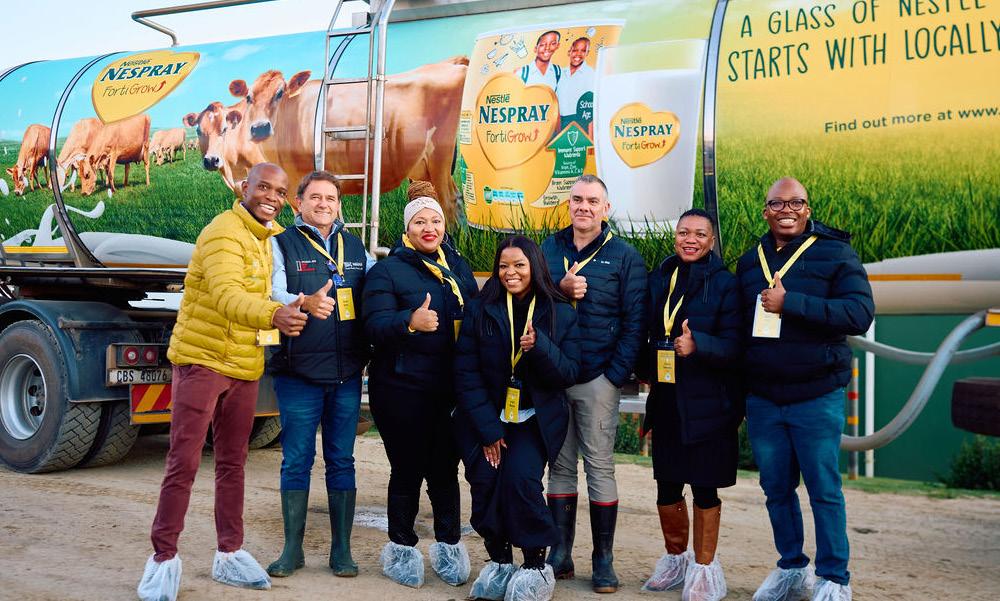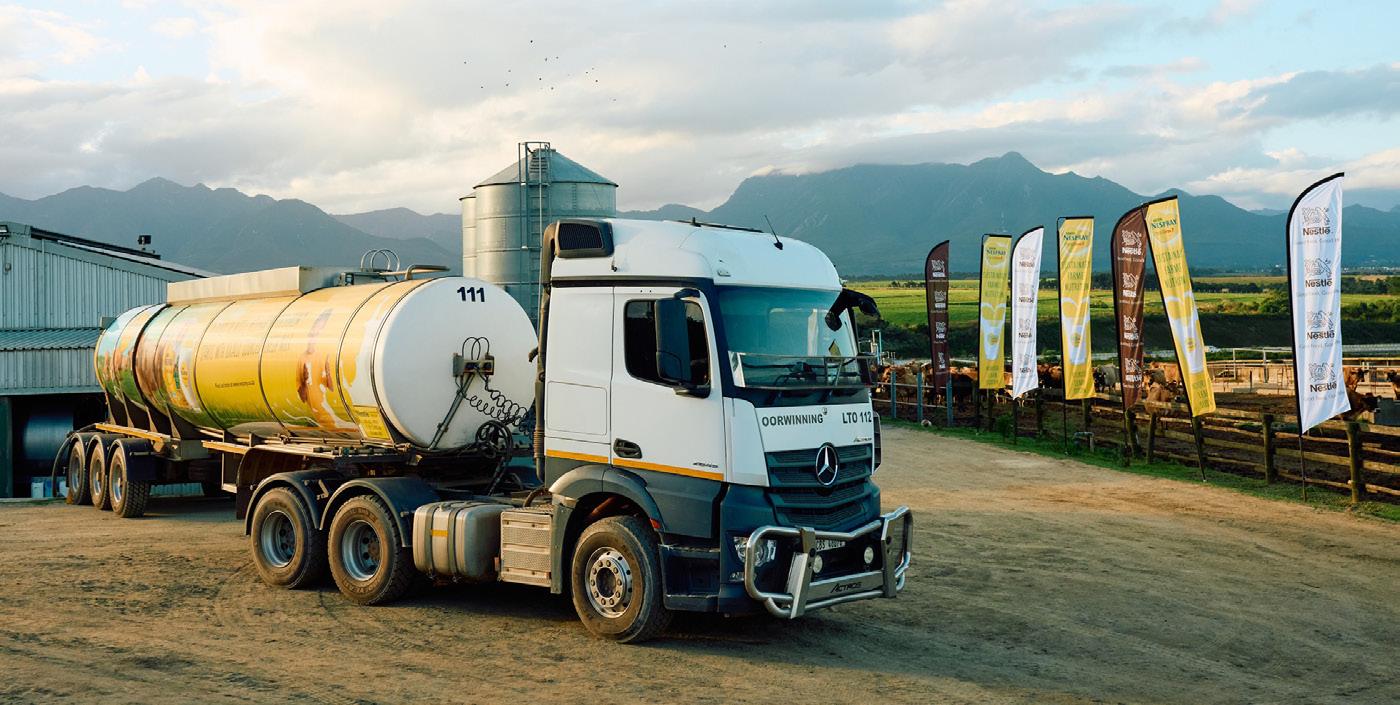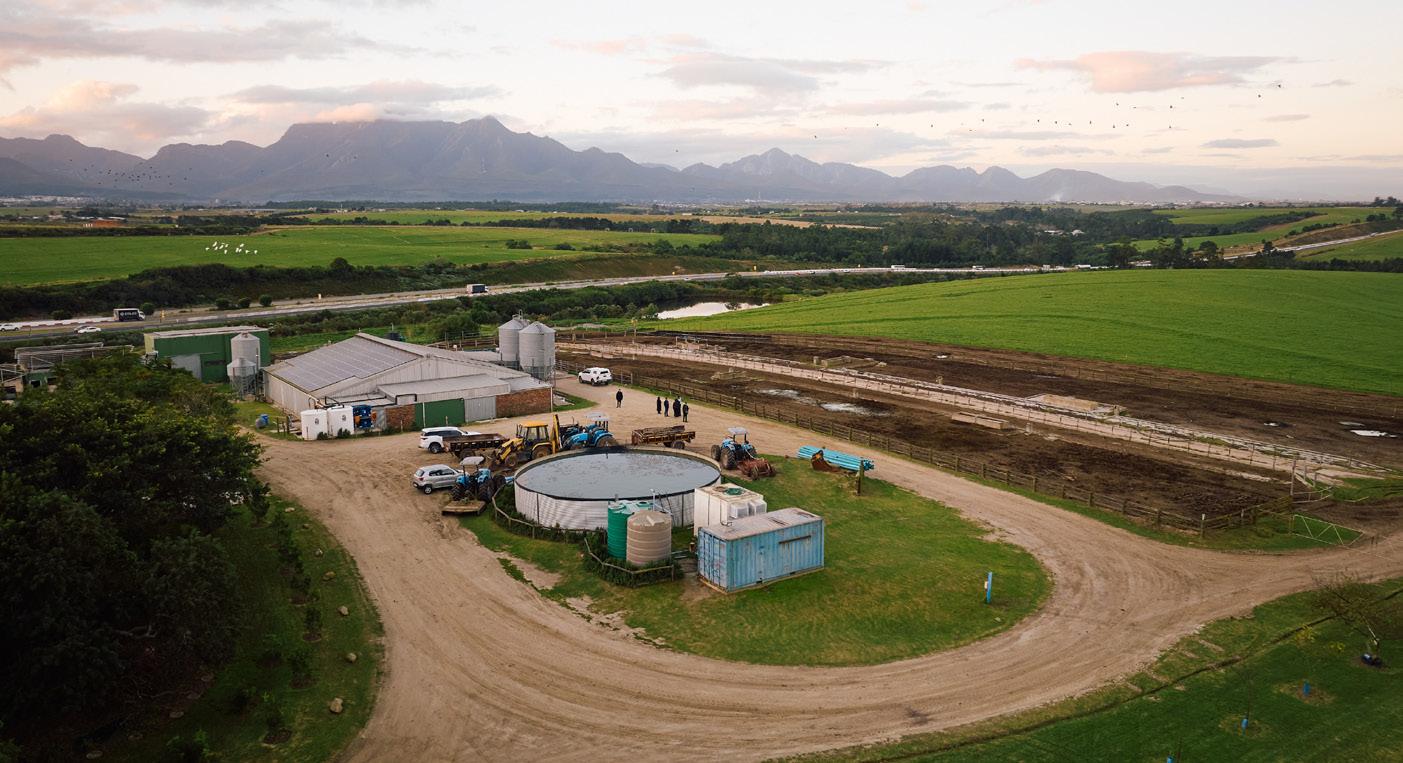
4 minute read
NESTLÉ® NESPRAY®
SCALES SKIMMELKRANS LOW CARBON PILOT TO A TOTAL OF 96 DAIRY FARMS ALONG THE GARDEN ROUTE
We believe that Nestlé’s example can be replicated by other companies in the food manufacturing value chain as their contribution to achieving low-carbon emissions, which as we know will have significant economic, social and environmental benefits for South Africa. - Tyikwe, CEO, Consumer Goods Council of South Africa
In celebration of Sustainability Month and World Milk Day, NESTLÉ® NESPRAY® announced the expansion of its groundbreaking, low-carbon dairy farming initiative in South Africa. Building on the success of the Skimmelkrans Dairy pilot in George, Western Cape, 96 farms along the Garden Route have now adopted these innovative practices, setting a new standard for sustainable milk production in South Africa.
NESTLÉ® NESPRAY®’s "farm to glass" journey transforms traditional dairy farming through regenerative agriculture. The 96 farms joining the movement supply fresh milk to the NESTLÉ® NESPRAY® factory in Mossel Bay.
The aim is to continue reducing carbon emissions while enhancing biodiversity. Results from the Skimmelkrans Dairy pilot to date quote annual averages of 500 tonnes of manure processed,
14.5 million litres of recycled water, and 6000 tonnes of carbon sequestrated through soil work. The intervention also includes cutting-edge techniques such as biological pest control and zero tillage, which minimise chemical use, improve soil health, and boost crop yields. Over and above these, a 285 kVA is renewable energy from solar installation using solar power.
Takudzwa Mupfurutsa, Business Executive Officer: Dairy, at Nestlé East and Southern Africa (ESAR), said of the initiative, “Our commitment to sustainability is unwavering. The expansion of our low-carbon pilot farm is testament to the success of regenerative agriculture in sustainable dairy farming.”
George Kuyler, CEO at Skimmelkrans Dairy added, “The switch to regenerative agriculture has transformed our farm. Not only are we seeing better yields, but we’re also contributing to a healthier environment.”
Speaking on these initiatives, Zinhle Tyikwe, CEO, Consumer Goods Council of South Africa said, “achieving low carbon under the UN SDG goals is a global imperative that requires the collective effort of governments, companies and society at large. In this regard, the Skimmelkrans project is a
laudable and shining example of efforts by Nestlé to reach waste free and low-carbon emissions by 2050. Nestlé is leading in showing that being environmentally sustainable and ensuring circularity can be profitable and make financial sense, while protecting the environment. We believe that Nestlé’s example can be replicated by other companies in the food manufacturing value chain as their contribution to achieving low-carbon emissions, which as we know will have significant economic, social and environmental benefits for South Africa.”
Skimmelkrans Dairy, the other 96 low carbon dairy farms and the NESTLÉ® NESPRAY® factory together employ in excess of 1000 individuals, indirectly impacting over 13000 people in our community. All these individuals contribute to the production of this proudly South African brand.
Proudly South African CEO, Eustace Mashimbye, said of the initiative, “Nestlé fully espouses the values of companies that are affiliated with Proudly South African, the national Buy Local campaign, with the principal value being the fact that our members have to contribute to the growth of the economy and the creation of jobs. Nestlé does this through increasing their levels of local content, across their respective value chains, including amongst others, the sourcing of milk locally from local farms as well as driving import replacement by sourcing packaging items and other raw materials for their products locally.
In this way, jobs are created across the entire value chain and not only in their direct operations. The entrenchment of sustainability in their processes and sourcing strategies is another criteria that Proudly South African members have to comply with, which Nestlé fully complies with, and is evident in all their current processes, including with their suppliers.”
Looking ahead, NESTLÉ® NESPRAY® aims to expand this initiative further, inspiring other dairy farms across Africa. By 2050, the goal is to achieve net-zero emissions, proving that sustainable practices are not only viable but also beneficial for industry and the planet.
“The advancements at Skimmelkrans Dairy and the expansion to influence the other 96 farms underscores NESTLÉ® NESPRAY®’s dedication to innovation and sustainability. These efforts will continue to support local economies, provide nutrient-dense products, and protect our planet for generations to come,” concluded Mupfurutsa.


For more information visit: https://www.Nestlé-esar.com/brands/ dairy/nespray










